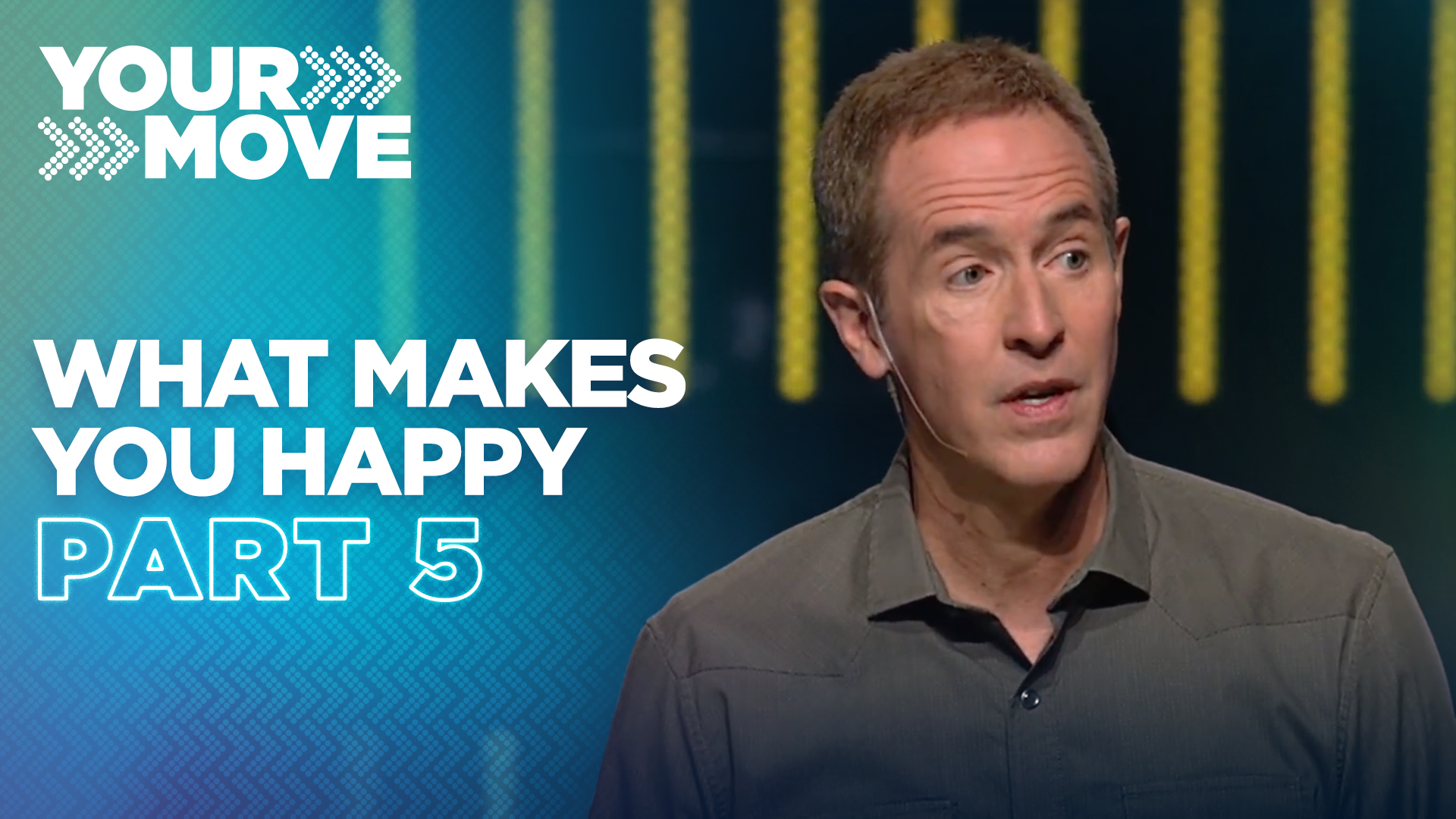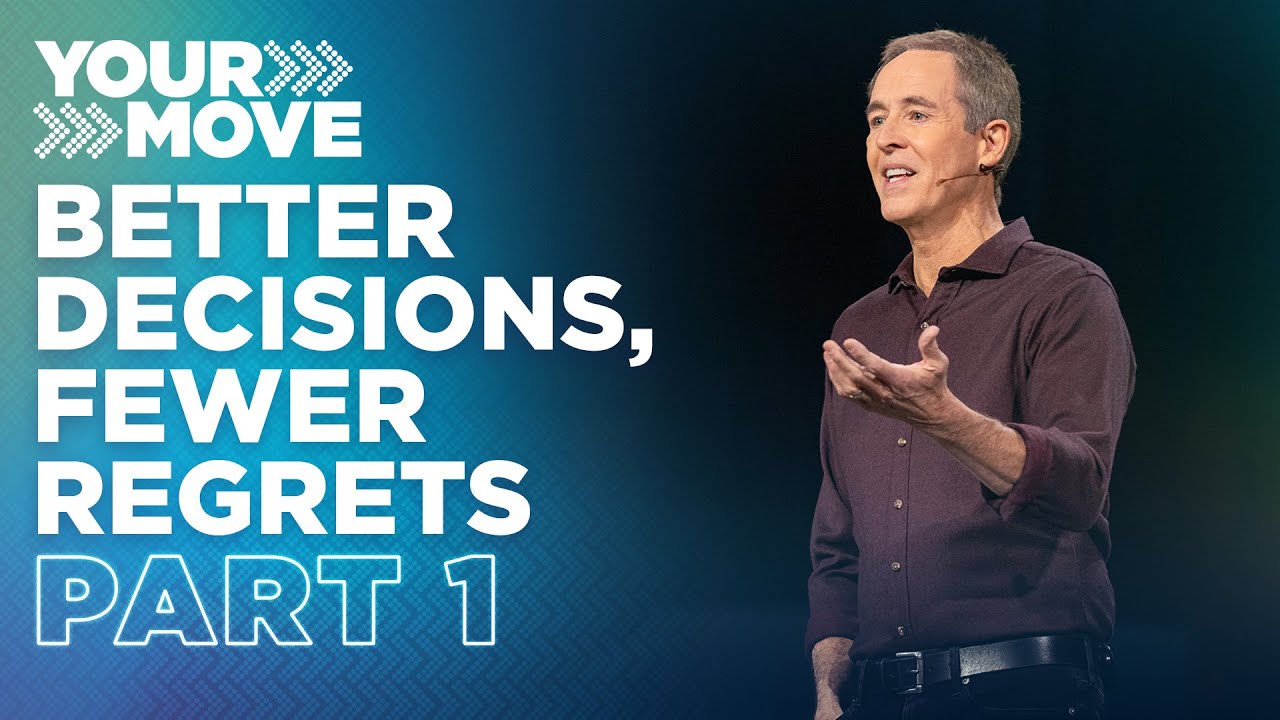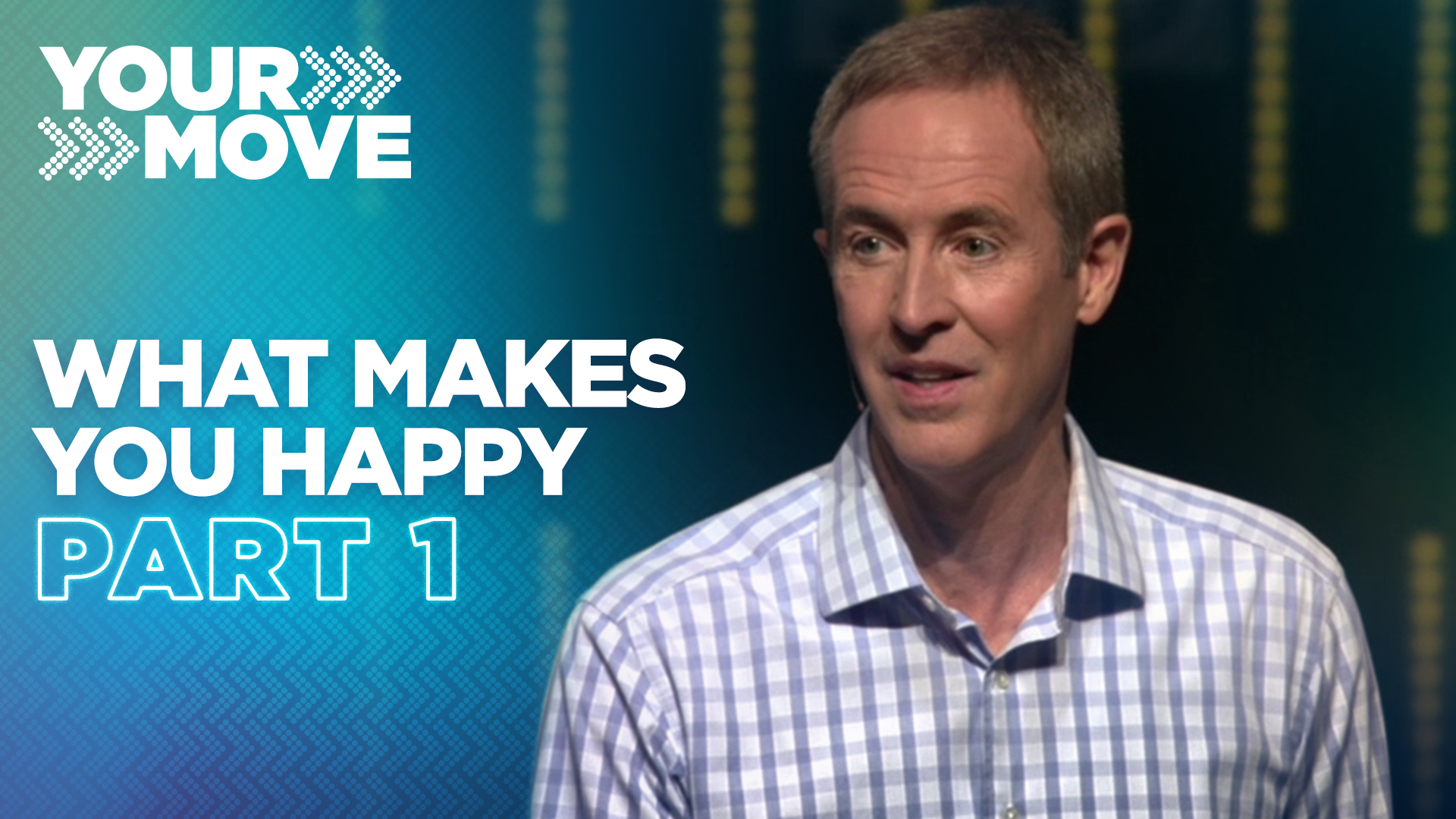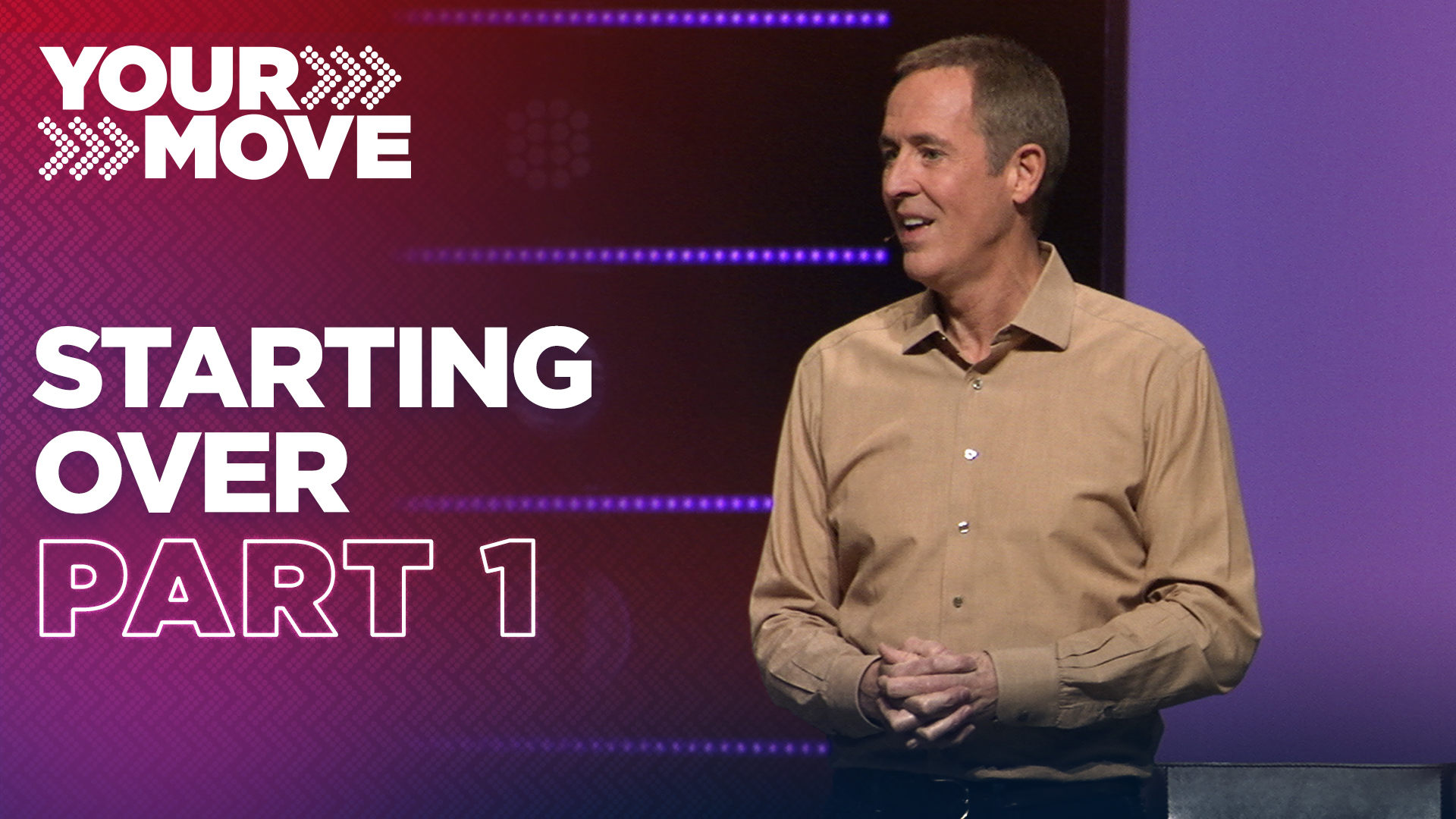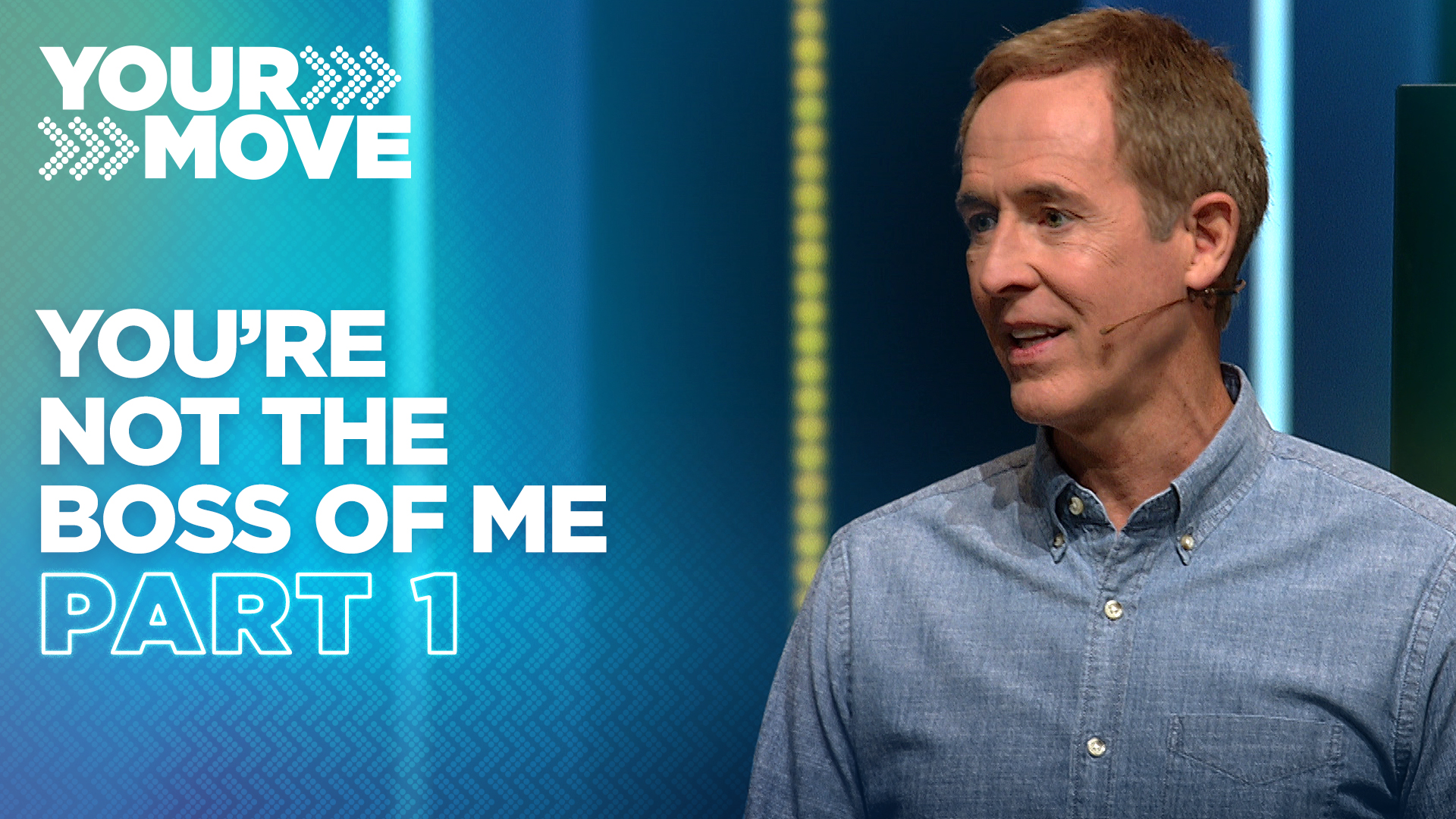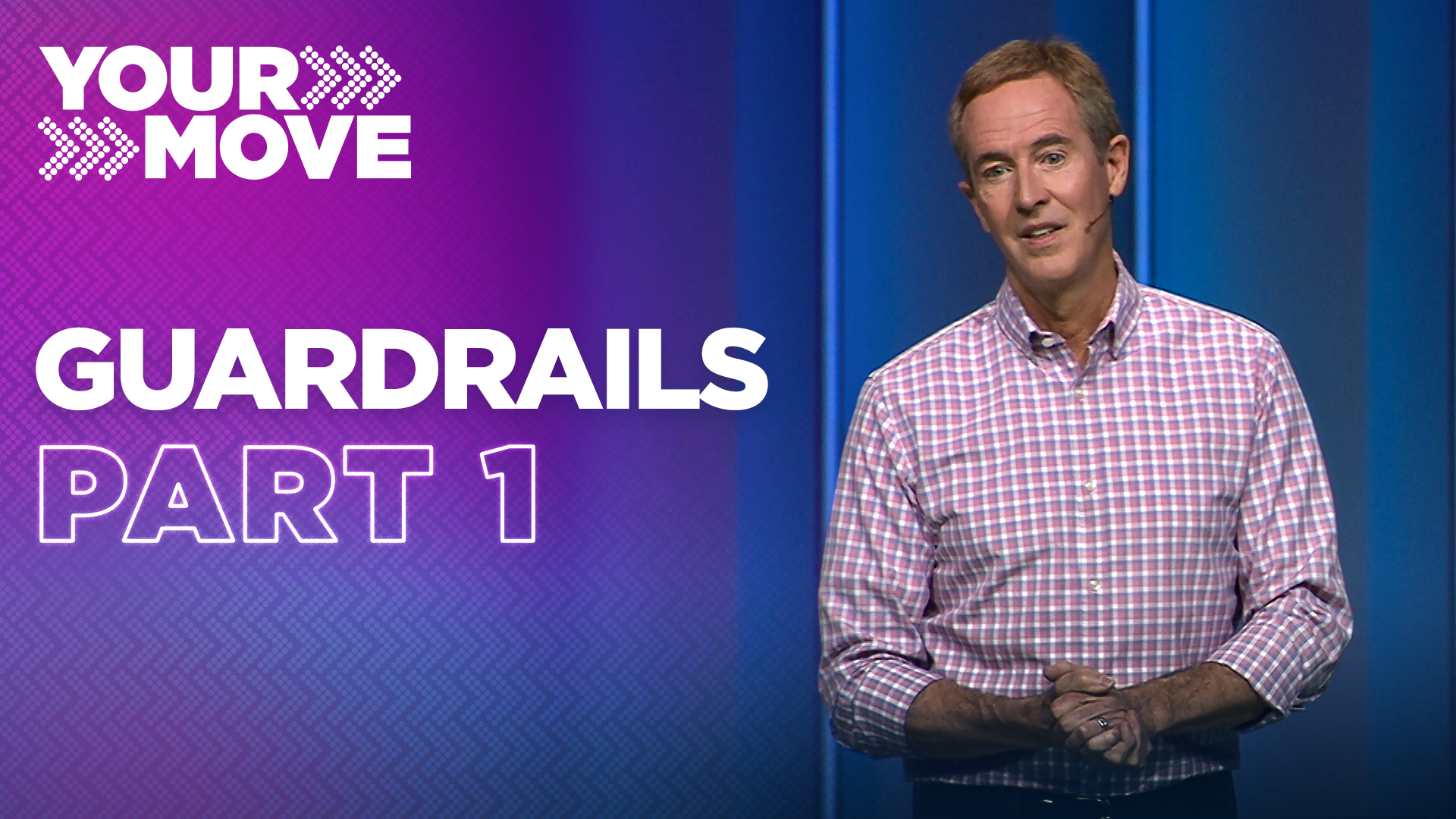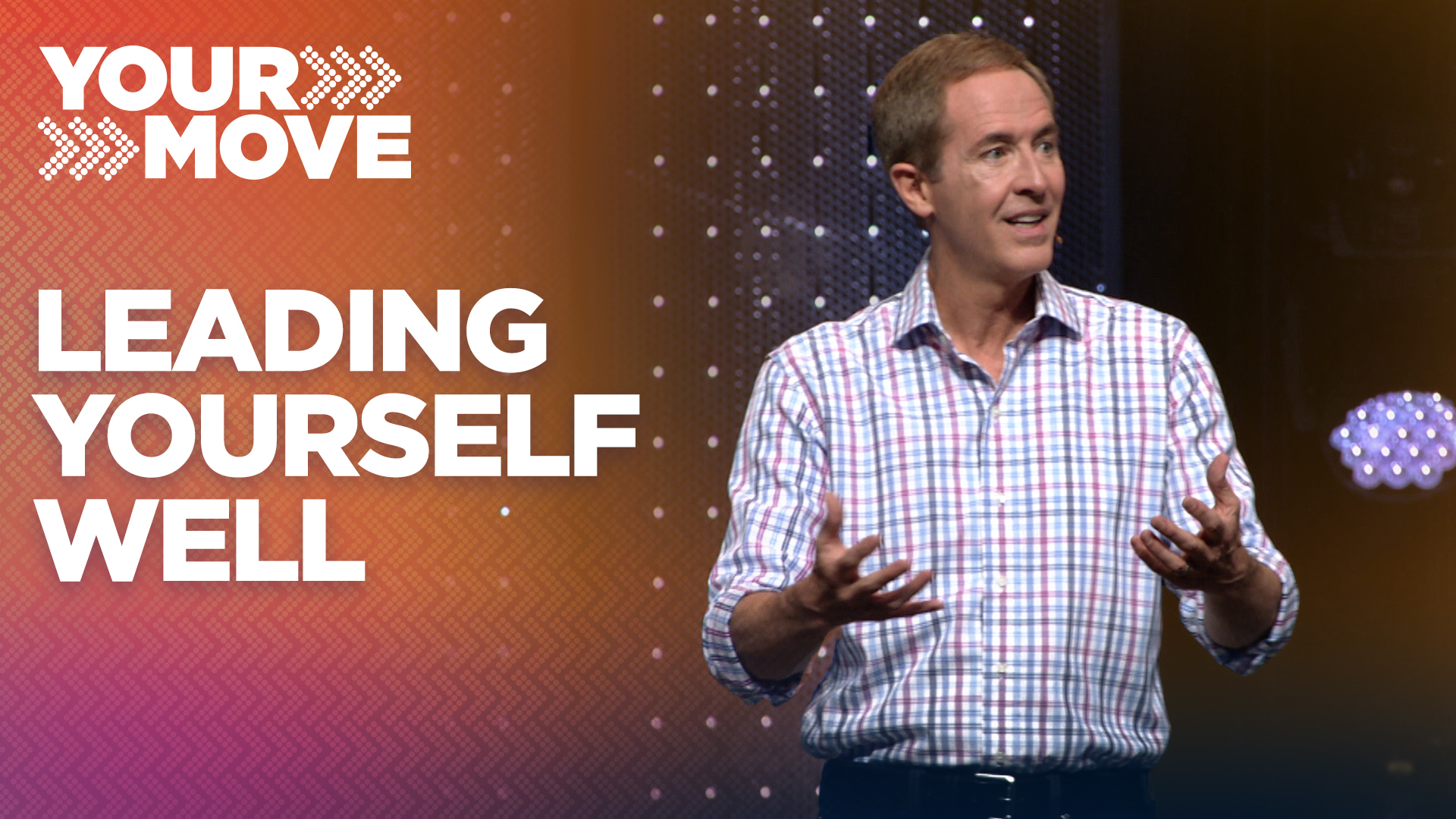Why is it so easy to make decisions that hurt us in the long run? In this episode, Andy explains that it has to do with the distinction between pleasure and happiness.
1. Have you ever seen someone undermine his or her own happiness even though that person couldn’t see it? If so, what did you do? What happened?
2. Think of a time when you ignored someone’s good advice. What were some of the factors that caused you to ignore the advice?
3. During the message, Andy said, “Eventually, pleasure loses its pleasure and becomes a prison.” Is it difficult for you to believe that? Why or why not?
4. Is there a pleasure in your life that is stealing your freedom and undermining your happiness? What can you do to change that? How can this group support you?
NOTE: The following content is a raw transcript and has not been edited for grammar, punctuation, or word usage.
One of the things that breaks my heart, and especially as a pastor I get ringside seat for way too much of this, is watching people undermine their own happiness, watching people make decisions that really just undermines their own happiness. And you’ve all been in the situation where you can see it coming, it’s like watching an automobile accident in slow motion. It’s like you watch the way this couple treats each other and you think, “Oh, there’s trouble on the horizon.” You watch the way somebody’s raising their kids and you wanna go, “You know, you’re raising them wrong,” but you dare not do that, but then 10 years later there’s trouble and you sort of saw it coming a little bit, and it’s not that you’re all that smart or have a crystal ball, but you’re adult so sometimes you just see this coming, and it’s tragic to watch people undermine their own happiness.
There is enough unavoidable pain in life without us creating unnecessary pain for ourselves. Isn’t that true? I mean there’s just… We’re all gonna have trouble in this life. In fact, one of the promises Jesus made that everyone knows comes true is he says, “In this life you’re gonna have trouble.” Nobody writes that down as a life promise and puts it up on their mirror, “Oh yeah, in this life we’ll have… ” Because you just know that. So with all the unavoidable trouble, why in the world would you create more trouble for yourself? And it just… It breaks my heart when I see people make decisions that, again, ultimately, not initially, not immediately, or we wouldn’t do it, but ultimately undermines their own happiness. And what I’ve discovered and what I’ve observed and what we’re gonna talk about today, is oftentimes, the reason we undermine our own happiness is confusion around these two ideas; pleasure and happiness, pleasure and happiness.
So today, I wanna talk specifically about these two words, and specifically about the relationship between these two words, ‘pleasure’ and ‘happiness’. But to get there I wanna begin with something Jesus said, that if you grew up in church perhaps you’ve heard, and I’m not gonna give you a lot of context, we’re gonna jump right into the middle, but these are powerful, powerful words. Jesus was teaching one day, and he was teaching and the people weren’t following him very well so he changed word-pictures right in the middle of a sermon to try to get people’s attention. And as he’s preaching this message he made a statement that sets us up for our discussion today, and here’s what he said: Jesus said, “The thief comes only to steal and kill and destroy.” “The thief comes only to steal and kill and destroy.” And when you read this within context, when Jesus refers to a thief, Jesus was referring to anybody, any person that steps into anyone’s life and as a result steals something, kills something or destroys something.
It can be something specific, it could be something in general. When you think about your life, anyone that steps into your life or anyone you intersect with, that ultimately as a result of that relationship, something is stolen, something is killed, or something is destroyed, Jesus would say within the context of this teaching, “That was a thief.” Now here’s the tricky part and here’s the part that you’re not gonna like, and this is gonna be a little bit of a downer for a couple minutes, so hang on. The person… Think about this. Let me ask it this way. Who in your life, if you’re 16 or older, 16 or older, who in your life has the greatest capacity or the most potential to steal your future from you, kill a relationship or destroy your life? When you think about your life, if you’re 16 or older, who in your life has the most potential to take something from you that you want, especially as it relates to your future, destroy your life or kill a relationship? And the answer is the same for all of us. It’s the person we look at every single morning in the mirror.
You have more potential to steal from you, kill a relationship or destroy your life than anybody else. You, in some capacity, are potentially your own thief. In fact, the way we say it in our vernacular is this, you ever heard this? “I am my own worst enemy. I’m my own worst enemy. I’m my own worst enemy.” So here’s the bad news today as we get started. It’s true. You are your own worst enemy. You have done more… You have done more to undermine your own happiness than anyone else, and you have the capacity to do more to undermine your own happiness than anyone else. And here’s how I know that you have the capacity to undermine your own happiness, because you bought it, you leased it, you ate it, you drank it, you smoked it, you dated it, then you slept with it, and some of you married it. Okay?
So you did this to yourself. Okay? And when you think back, when you think about unhappiness, you were there for all of that stuff. You are the common denominator in every single event of your life. And as much as we wanna blame other people for our unhappiness, the truth is, we are our own worst enemy. And Jesus says, “The thief, the thief is the one that comes into your life and steals something, steals your future, kills something, kills potentially a relationship or destroys something”. So in some capacity we are oftentimes that person. And then he makes this extraordinary, extraordinary statement, he says this, “I, in contrast, I unlike the thief, I have come that they… ” And they was his first century audience and they is you-they and me-they and we-they. “I have come that they may have life.”
Now, when Jesus said this apparently he did not get the response he wanted from the crowd, they’re just kinda staring at him, because he’s talking about this whole sheep and shepherd thing, and they’re trying to figure out who’s the sheep and who’s shepherd and what’s he talking about. And Jesus says, “I’ve come that they might have life.” And nobody responds. And so he adds this phrase that kinda teases this out and punctuates it. He says this, “And have it to the full.” Now the problem with this English word is it does not capture the full weight of the Greek word, it doesn’t capture the energy of the Greek word. In fact if you grew up in church and grew up around the King James Bible here’s how you heard this verse: “I’ve come that they might have life and might have it more… ” what?
Abundantly.
Abundantly. I mean that’s a way better word than full, and abundantly captures the energy. He says, “I’ve come that you might have life and have an extraordinary life, an abundant life. The kind of life that when people meet you they go, “Wow!” When people meet you they’re like… It’s just, there’s just something different, and what’s different isn’t that you haven’t had a hard time, and the difference isn’t that you’ve always gotten everything you wanted. The difference is something that’s sort of internal that has made it’s way into the way that you respond to life around you. “I’ve come that you might have an abundant, abundant, abundant life.”
And then he makes this statement about himself, he says, “I, I’ve come that you might have abundant life,” he says, “and I am the good shepherd.” Now this means nothing to us because we don’t know anything about sheep and we don’t know anything about shepherds, but in the first century they kinda leaned in like, “Okay now you’re talking about something we understand.” “I am the good shepherd.” Well how good? Here’s how good. The good shepherd, not the average shepherd, but I haven’t come to give you an average life, the good shepherd lays down his life for the sheep. Now this is so important, especially if you’re new to church or you’re just coming back to church or you had a bad experience in the church, understand this: No matter what you read in the Old Testament, no matter what you read in the New Testament, whatever you read within the scriptures you need to understand the context for all of that is that God sent his son into the world to be a good shepherd, and Jesus says a good shepherd lays down his life for the sheep.
If someone is willing to lay down their life for you, they are for you. If someone is willing to give their life for you, they are for you. And this stands in sharp contrast to what the thief does. The thief comes to steal and to kill and destroy. Jesus says, “I’m the good shepherd and I’ve come to give and to build and to protect.” And so you have a decision to make. Are you going to go and follow the thief, the thief that maybe someone in your life or often times is the person in the mirror, or are you willing and am I willing to decide that Jesus really is the good shepherd and I’m gonna follow a good shepherd who is for me?
Now, the problem with this is that in this passage Jesus compares you to sheep, and sheep are not all that smart, in fact, some people say sheep are stupid, and so this is offensive, but you shouldn’t be offended, and here’s why, because as I said earlier, you bought it, you leased it, right? You ate it. You drank it. You smoked it. You dated it and you’re glad there isn’t room for more things on this screen because of all the dumb things you’ve done.
[laughter]
Bottom line, you made some baaa-d decisions.
[applause]
I thought that was kind of cute. All right. So Jesus knows what he’s talking about, you often times are your own worst enemy. And Jesus says, “All I’m saying is this, I’m a good shepherd, and as offensive as it may be to think of you as a sheep, I’m asking you to follow me.” Now here’s the thing, at times you’re your own worst enemy but you’re not your only enemy, and for those of you who are Christians you understand this, for those of you who are new or considering Christianity, when you open the New Testament it’s so interesting, the authors of the New Testament personify this word right here: Sin. They treat sin as if it’s an entity or a power, and we’re all familiar with this, regardless of what you think theologically, and the New Testament says as we said a couple a few weeks ago, that sin always separates. You can define sin in an Old Testament way, a New Testament way, or you can make up your own definition of sin, which is simply bad things or when people do bad things or hurt other people, however you define sin, at the end of the day, sin always separates. We said sin separates us from God. Sin separates us from ourselves, and sin separates us from others.
The reason you’re having trouble relationally is because somebody did something you think is wrong or you did something they think is wrong. Sin always separates. Sin separates us from ourselves. This is why you have said, or you have thought, or you have heard, “I can’t live with myself. I can’t live with myself. If I ever did that I would not be able to live with myself.” What is that? It’s like, even internally there’s a separation when we do certain things. Sin always, always, always, separates. So you could say this if you use Jesus’ term: Sin comes only to steal, to kill and destroy, that’s what sin does. So you have an enemy without, you have an enemy within, and I have an enemy and you have an enemy in the mirror. And consequently if something doesn’t change and if we’re not careful, we undermine our own happiness, we undermine our own happiness.
Now, the thing is, we know this. In fact, so far I haven’t told you anything you don’t know. Nobody’s like, “That’s unbelievable, I undermine my… I had no… ” It’s like, all you’re doing is thinking of illustrations. Why is it that we do the same dumb things over and over and over like a bunch of sheep? Well part of it, in fact I think a really big part of it, and that’s why I kinda want to kind of sneak up on this topic and kinda come through a side door. A big part of that dynamic, and this is true whether you’re Christian, not a Christian; religious, non-religious, it doesn’t matter, this is just a people thing, a big part of it is our confusion around these two words: Pleasure and happiness, pleasure and happiness.
Now, if you are new to church, this should come as a good surprise. If you’ve been in church your whole life you may have never heard anybody say this, you may not even believe it, and it’s okay to argue with me in your mind and check it out later. But did you know that God created, and this is great news, God created you with the capacity to experience both? That God created you to have the capacity to experience pleasure, God made that, and God created you with the capacity to experience happiness. Think about this: God created sexual pleasure, God made that up. Just toward the end of creation, he’s like, “I got a great idea.”
And the angels are like, “What?” And he’s like, “You just wouldn’t understand.”
“See all those animals running around reproducing? We’re gonna add a little something to the human race. This is gonna be something. It’s gonna get them in a lot of trouble ultimately, but it’s gonna… “
So in some capacity, in some kind of cosmic way, God created sexual pleasure. Get this, Jesus made wine, and he made it right up front. Most people consider it his first miracle, it’s like, “Let’s get this thing started, should we heal somebody?” “Nah.”
“Let’s make wine.” “Are you sure you want to start there?” “Yeah, let’s just make some wine.” Ladies, all the disciples, they wore shoes, okay? So the point being this, that God created the capacity for pleasure, just like God created the capacity for happiness. God is not against pleasure any more than God is against happiness. The problem is, it’s not an either or, it’s not an either or. The problem is priority, the problem is priority. And when we prioritize pleasure over happiness, there’s a problem. In fact, when you prioritize pleasure over happiness, ultimately you get neither, because the truth is, one leads to the other, but the other ultimately undermines the one. One can lead to the other, but the other ultimately undermines the one. Happiness can and will ultimately lead to pleasure. In fact, I believe that it leads to maximum pleasure in this life. But if you pursue pleasure, and ignore the principles that lead to happiness, at the end of the day, you have neither, because eventually, and you know this, we’re adults, right, eventually, pleasure loses it’s pleasure and becomes what? A prison, because of the law of diminishing returns; you used to take half a glass, then a whole glass, then two glasses, then three, then four, now you’re yelling at people and don’t even remember what happened the night before. What happened?
That over time, every single pleasure, every single legitimate pleasure, over time, if it becomes a master, if it becomes the priority, pleasure loses it’s pleasure. What begins as a past time becomes a pathway, it becomes a habit, it becomes an addiction, and often times it becomes a prison. And these aren’t things that are illegal, these aren’t things that are immoral, these aren’t things that anyone would consider wrong. But in your life and in my life, when we prioritize any pleasure, any pleasure over the principles of happiness as we’ve talked about them these past few weeks, and as Jesus lays out in the Sermon on the Mount, at the end of the day, all pleasure loses it’s pleasure.
Now the Apostle Paul who came along and wrote about 25 or 30 years after Jesus resurrection, he takes the teachings of Jesus, contextualizes them for those of us who aren’t Jewish, he wrote to primarily a gentile audience. He writes to some Christians in Rome and he kind of teases this idea out just a bit, and listen to how he says basically what we’ve said, kind of in his New Testament way. Here’s what Paul wrote: He said this, and I love this, Paul did this all the time, “Don’t you know?” He would always start off, “Don’t you know?” Now, this was his way of saying, “Really? Really? Do I really even have to say this? Don’t you know? “Don’t you know, that when you offer yourselves to someone or something, that when you offer yourself to someone as obedient slaves, you are slaves of the one you obey?” When you read that you go, “I don’t even know what he’s talking about, no I didn’t know that, ’cause I don’t even know… What does that even mean?” So let me read it again, “Don’t you know… ” Now think about this. Don’t think about theology, don’t think about Bible, just think common sense. “Don’t you know that when you offer yourself… ” “I’ll take one of those, I’ll do that. Yes, yes, yes, yes.” “Don’t you know when you offer yourself to someone or something as obedient slaves, you are slaves of the one you obey?” In other words he says, “If you continue to say yes to a pleasure over and over and over, don’t you realize that you are becoming a slave to that pleasure?” You go, “I’m not a slave, I’m choosing.” And he’s going, “See, that’s my point. Don’t you know that if you choose the same thing over and over and over, you’re no longer choosing, you’re being drawn in. You are giving up control. You are behaving like a slave. You’re behaving as if you have to, not simply that you want to.”
And then he goes on, he says, “Whether, you are slaves to sin; every time sin comes calling you answer the door, “Come on in, come on in.” Whether you are slaves sin, which leads to death, and we’ve talked about this a few weeks ago, sin always leads to death; Old Testament sin, New Testament sin, your definition of sin, all sin leads to death, sin always kills stuff. It kills the way you view yourself, it kills your marriage, it kills your relationship with your kids, it kills your relationship with your employees, your employers, sin always kills stuff. Wherever there is sin something is dying. He says, “So either you offer yourself as slaves to sin which leads to death, or there is an alternative”, and now he’s leaning into what Jesus said. He said, “Or you can offer yourself to obedience, to God through Christ, which leads to righteousness.” And righteousness is just a fancy New Testament word that means ‘to have a right… ‘, ‘righteousness’, ‘right’, ‘right relationship or right standing with God’. And Paul says, “Look, don’t you realize that every single day of your life, every single day of your life, you are offering yourself… You are offering yourself as a servant to, or a slave to, you are offering yourself through obedience to, either sin… ” Or in our case we’re gonna use the term ‘pleasure’, and not all pleasure is sin, most pleasure’s not a sin, but you’re offering yourself to something or someone.
He says, “When you do that, when you obey, when you say yes over and over and over, you are giving up your freedom, and you are acting like a servant or a slave,” and he said, “You can either do that to pleasure, you can do that to sin, or you can lean into and offer yourself up as a servant or slave to your Heavenly Father.” Jesus’ way of saying it is, “You can follow me because I’m a good shepherd.” And Paul would say, as we saw a few weeks ago, “And when you say yes to God, when you say yes to God, you have, remember this, peace with God, which paves the way to peace with ourselves, which equips us to make peace with others.” He says, “When you decide to follow Jesus as the Good Shepherd, when you decide to opt for obedience to God, obedience to God is gonna pave the way to have peace with ourselves, ‘I’m good with me’, and often, and eventually it equips you to make peace with others.” And my friends, we’ve discussed this, this is happiness. Every happy person you know is at peace with themselves. Every happy person you know has figured out how to make peace with people, and even people that don’t wanna be at peace with them, and most happy people that you know have somehow found peace with God.
So if you say yes to any pleasure over and over and over and over, you have become a servant to, a slave to that pleasure, and when pleasure takes precedence over the principles of happiness, ultimately you have neither pleasure nor happiness.”
Jesus’ way of saying it is simply this, remember? “If you sow better, you’ll reap better, and then you’ll feel better. If you sow better, you’ll reap better, and ultimately you’ll feel better.” And here’s why this is so important, because here’s where we get in trouble: We get in trouble when we’re unhappy, and when we’re feeling unhappy, we immediately wanna do something that makes us feel better. Isn’t that how we get in trouble? “I’m unhappy, so I’m gonna go shopping.” “I’m gonna go happy so I’m gonna stop by the wherever.” “I’m unhappy, so I’m gonna call so-and-so ’cause I know they have some.” “I’m unhappy and I’m gonna call her.” “I’m unhappy, I need something to kinda pick me up, I need a quick fix.” That’s when we make decisions that ultimately undermine our own happiness. And here’s Jesus’ message to all of you who are unhappy: He says, “There is no quick fix to happiness, you sow and you reap your way there.” Happiness is not immediately accessible, but as long as you are saying yes to pleasure, over and over and over, to somehow be a quick fix for your lack of happiness, ultimately you undermine your own happiness because you’ve become a slave, a servant, to the one to whom you give obedience.
And so Jesus says, “Sow better, reap better,” and ultimately, not immediately, not this afternoon, not tomorrow by 5:00, but ultimately you will feel better. But if your response to unhappiness is, “I’ve gotta do something right now to feel better,” ultimately you’re undermining your own happiness, and you already know that, don’t yeah? Because every single one of us in this room, including me, we know what our end… We know the thing we reach for to give us that quick fix when we’re not feeling happy. And every time you obey that inclination, Paul says, you are acting like a slave or a servant to something that ultimately undermines your own happiness. This is why, this is why you hear us say from time to time, that following Jesus, following Jesus will make your life better, and following Jesus will make you better at life, that following Jesus, Jesus who says, “I’m the good Shepherd, you can trust me, follow me.” Following Jesus will make your life better, and ultimately following Jesus will make you better at life, but it’s not instant, it’s not a quick fix. It’s sowing, and sowing and sowing and sowing, and ultimately reaping.
So, I’ve gotta ask you kind of a tough, probing question, okay? And when I ask you this question here’s what I want you to do, okay? Don’t argue, okay? I’m gonna ask you a question, but nobody can read your mind, so there’s no point in not admitting to yourself… And this isn’t a trick, it’s not like, “And if you answered the question this way, I need you to raise your hand. Now I need you to stand up.” We’re not gonna do that okay? This is… I just want you, no matter what your religious… You may not be religious at all or you may be like me where you were basically born in the church, you’ve been to church your whole life. Here’s the thing: I just want you to answer this question for you, because you owe it to yourself to know, and as we’re gonna discover, you owe it to the people who love you, to know the answer to this question, and to admit this to yourself, because remember, only a thief, only a thief will try to steal your future from you. Only a thief will try to kill your relationships, and only a thief will try to destroy you. So why not acknowledge what’s true about you today? Only a thief, only a thief would not want you to answer this question.
Okay, so you’re ready? Here’s the question: Is there a pleasure that’s undermining your happiness? Is there a pleasure, not a sin, maybe a sin may not be. Is there a pleasure… It’s not immoral, it’s not illegal, although it may be immoral and it may be illegal or it may sort of be illegal, but nobody cares. Is there a sin that is beginning… Is there a pleasure rather, that is beginning, beginning to undermine your happiness? In other words, if you’re real honest, and don’t want to admit it, I know you don’t want to admit it, ’cause if you admit it then you have to do something about it. No you don’t, you don’t have to do anything. I just want you to be honest with yourself. Is there a pleasure that you have said yes to so many times, it is beginning to undermine your happiness? Is there a pleasure, that if you continue to say yes to it, it’s going to undermine the happiness of the people that you care about the most.
Is there a pleasure? Come on, it’s just you, it’s just you and you. Is there a pleasure that has begun to undermine your happiness? If you continue to say yes to that pleasure, you’re a thief, you are in opposition to Jesus’ invitation to follow Him as the Good Shepherd.
Let me ask a different way, as if that wasn’t clear enough: Is there a pleasure that’s slowly taken you prisoner? Is there a pleasure, it may be illegal, it may be legal; it may be moral, it may be some people don’t know. It doesn’t matter. Is there a pleasure, that is slowly taking you prisoner? You are slowly losing your freedom to say no. Not only do you answer the door every time the doorbell rings, you find yourself staring out the window hoping it’s going to show up soon. Is there a pleasure that is slowly taking you prisoner, that without meaning to, without meaning to, you have prioritized the pursuit of pleasure over your pursuit of happiness?
You know the answer to that question, and you don’t have to answer it for anybody but for yourself. But here’s what I want you to know, as if you need me to tell you: One day you’ll wish you had quit answering the door. One day you’ll look back and wonder why you’re so unhappy, and you’ll discover in that moment, as many of you are discovering right now, that you have become your own worst enemy, that you are in fact a sheep, who needs a shepherd. And perhaps by God’s grace today, perhaps by God’s grace today, you would be willing to trade your pleasure for a shepherd, that you would be willing to trade your pleasure for a good shepherd, who is not gonna drain you of life, but a good shepherd who has come into this world to promise you, and to give you life, and that is an exchange you will never, ever, ever regret, because Jesus said, “I am the good the shepherd, and I am so good, I was willing to lay down my life for my sheep, so that they might have life, and have it to the full.”


